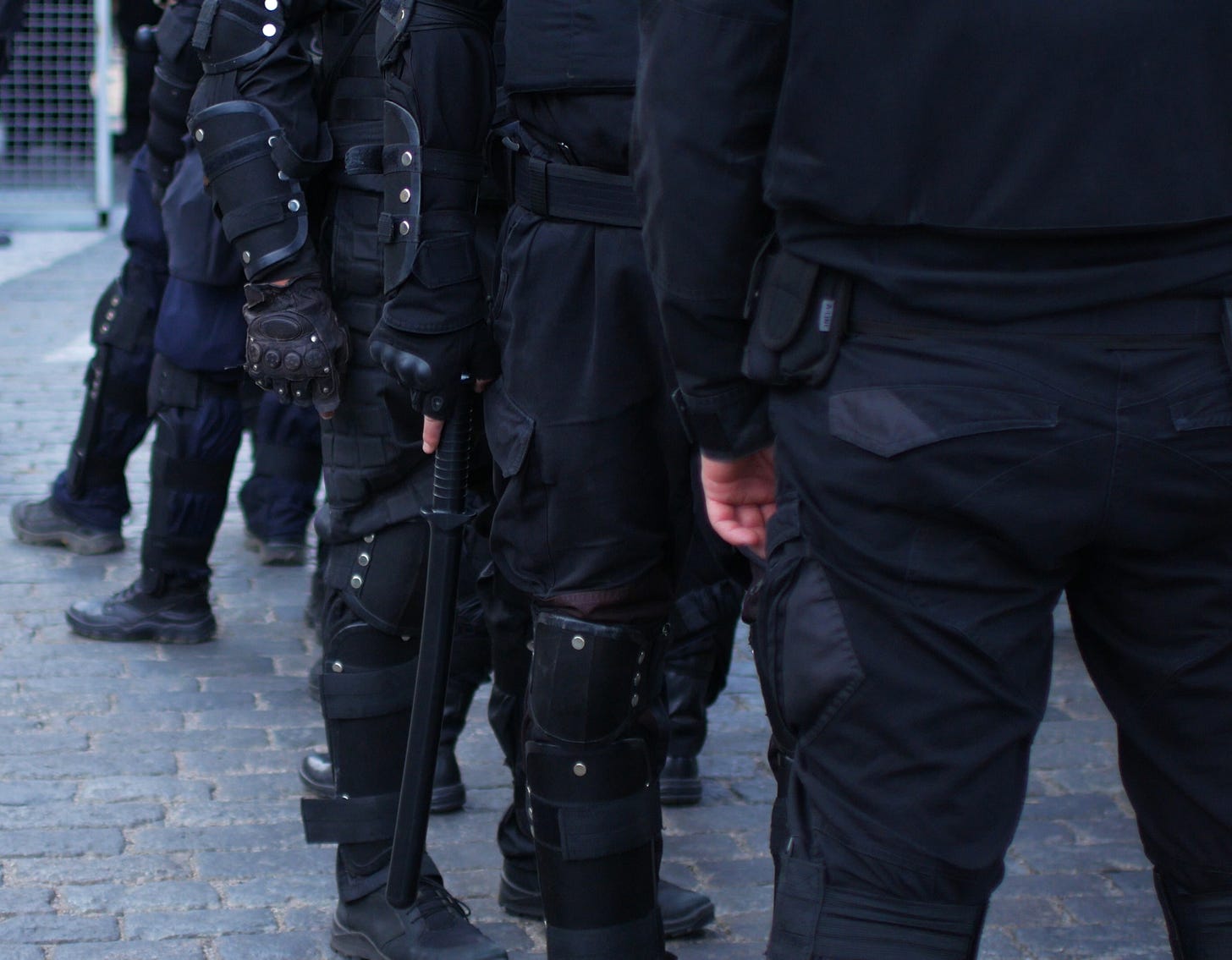Living in the American Police State
Fear, Denial, and Dissociation in the "New America" (Vol. 5; Issue 15)
America’s descent into autocracy shocks most of its citizens. Did you hear that Trump publicly joked about how his friends made “billions” shorting the stock market?* And recent events reveal how the final nails pound into the coffin of the American experiment in democracy day by day. Consider just these few examples:
Last week, the Trump administration refused to provide the “daily updates” mandated by Federal District Judge Paula Xinis. Finding Kilmar Abrego Garcia’s deportation to a Salvadorian prison last month “inadvertent and illegal,” Judge Xinis required Trump officials to update her on progress in getting Abrego Garcia released. She calls their refusal to provide these updates “extremely troubling.” A few days earlier, the Supreme Court unanimously ordered Trump to “facilitate” Abrego Garcia’s release. Justices Sonia Sotomayor, Elena Kagan, and Ketanji Brown Jackson attached this statement to the Court’s unanimous decision:
The Government’s argument implies that it could deport and incarcerate any person, including U.S. citizens, without legal consequence, so long as it does so before a court can intervene.
Despite these legal rulings by the highest courts of the land, Trump officials stand in defiance. Even the highly conservative Wall Street Journal’s editorial board thinks it unwise, writing:
The Trump Administration hates to admit an error, but its obstinance here serves no purpose. Mistakes happen. Why not ask the Salvadoran government to send Mr. Abrego Garcia back to unite with his family?
Meanwhile, mass deportations continue. They have an increasingly Nazi-esque ring to them. When Columbia graduate student Mahmoud Khalil was arrested on March 8th, his pregnant wife asked the name of the plain-clothes agent subduing him. The officer replied:
We don’t give names.
And Marco Rubio, overseeing and justifying such deportations, proclaims:
We’re looking every day for these lunatics.
Proceeding to another example, Trump targets major law firms because they represented individuals who sought justice in cases regarding him. Cowardly firms, like Kirkland & Ellis and Latham & Watkins, caved. They agreed to do free legal work on causes the White House supports. A few courageous ones, like Susman Godfrey, which helped deliver Dominion Voting Systems a multimillion dollar settlement against Fox News, are suing the Trump administration because his executive order prevents them from practicing. In a lawsuit filed last Friday in US District Court for the District of Columbia, Susman Godfrey attorneys wrote:
If President Trump’s Executive Orders are allowed to stand, future presidents will face no constraint when they seek to retaliate against a different set of perceived foes. What for two centuries has been beyond the pale will become the new normal.
Paralleling the attacks on law firms, Trump also assaults universities. He not only wants to remove any “woke” or DEI ideology, he wants to disempower them. I focus today mostly on the risk of a dictatorship; in earlier issues, I have compared Trump’s loyalty requirement to a Mob boss. In confirmation, New York Times opinion columnist Masha Gessen (2025) writes:
Like much of what this administration does, the war on higher education is driven by anti-intellectualism and greed. Trump is building a mafia state, in which the don distributes both money and power. Universities are independent centers of intellectual and, to some extent, political power. He is trying to destroy that independence.
On to another illustration, the Trump administration plans to cut healthcare for the poorest Americans, namely the Medicaid program. One in five Americans rely on it. Despite promises not to do so, Trump has placed the program on the chopping block. If millions lose access to Medicaid, myriad problems result: a higher incidence of crushing debt from medical expenses, an increase in untreated diseases, and (less considered) a rise in crime by angry, impoverished Americans. Speaker Mike Johnson leads a cadre of Republican representatives working to make $880 billion of cuts in Medicaid.
These three illustrations—but a few of Trump’s actions qualifying as autocratic—sow fear in many Americans. I have Latino and Asian friends, as many readers do, who fear deportation despite being either naturalized or birthright US citizens. When visiting friends, shopping, or going out to dinner, they feel a wariness new to their experience as Americans. Trump’s direct targeting of law firms, which even historically hired attorneys to work on cases against him**, either comply (under duress) or fight back (expensive).
The Medicaid cuts deserve separate emphasis because of the pandemic of income inequality. Wealth inequality is even more pronounced. The top 1% of Americans hold the largest share of the nation's wealth, while the bottom 50% holds but a small percentage. Racial and ethnic disparities in income and wealth also persist. Unsurprisingly, the rich get richer, while already-struggling minorities become still more marginalized.
Straying a bit outside my pay grade, consider how the Russian system—more dictatorship than autocracy—works. Putin, a far more intelligent man than Trump, arranged to change constitutional term limits from four to six years. He has officially served as president since 2012. Since then, he has changed term limit laws again—allowing him to remain in power until 2036. Sound familiar?
The Russian government has a parliament, the Duma, much like actual democracies. But, like has occurred in America since Trump took office, it rubber stamps Putin’s policies. Russia’s highest court, known as the Supreme Court of the Russian Federation, is the nation’s highest judicial body. It serves mostly a repressive function. For example, just last week a court in St. Petersburg sentenced Alexander Skobov, a 67-year-old dissident, to 16 years in prison because he posted his support for Ukraine’s 2022 strike on the Crimea Bridge on social media. Free speech, declining rapidly in the US, died long ago in the Russian Federation.
The jury is still out (pun intended) as to whether or not the US Supreme Court will take a stand against Trump. And, who knows if Trump will adhere to its rulings (as just noted). Meanwhile, in Russia, corruption and repression are rampant. The rich owners of many of Russia’s privatized businesses can only operate if they continue to support Putin. (In America, we have Elon Musk, Jeff Bezos, Mark Zuckerberg, etc., dancing to the same tune).
Further, Putin maintains dictatorship-like stature by severe repression of dissent and use of state-owned media outlets to spread propaganda and disinformation. Many high-profile critics or detractors have been physically attacked—the most prominent one of late being Alexei Navalny. Years earlier, on November 1, 2006, Alexander Litvinenko was poisoned while living in exile in the UK. Two ex-KGB officers with whom Litvinenko met in London placed a lethal dose of polonium-210 in his tea. It produced acute radiation syndrome, causing him to die a horrifically painful death on November 23.
Thankfully, no evidence exists, yet, of Trump directing the assassination of his political opponents. Meanwhile, he checks every single box for behaving like an autocrat: He suppresses dissent, punishes political opponents, castrates the Congress, and (quite possibly) controls the US Supreme Court.
Hannah Arendt (1951), a historian/philosopher specializing in how democracies devolve into autocracies, must be rolling over in her grave. She would have predicted how Trump seeks to replace the rule of law with rule by one man. Here we sit, reading stories of abductions of legal residents by unidentified, masked agents, of revocations of visas without notice or legal cause, of Congress ceding the power granted it by the constitution, and of the targeting of law firms, universities, the media, and any institution or person opposing him.
In her book, The Origins of Totalitarianism, Arendt writes:
The idea subject was not the convinced Nazi but the people for whom the distinction between fact and fiction no longer existed. The most cherished virtue is loyalty to the leader.
She adds:
Totalitarianism replaces all first-rate talent with crackpots and fools, whose lack of intelligence and creativity is still the best guarantee of their loyalty.
Regarding “crackpots and fools,” I give you Robert F. Kennedy (Director of Health and Human Services), Pete Hegseth, (Secretary of Defense), and Kash Patel (FBI Director), not to mention Elon Musk. These are but a small sampling of the “useful idiots” appointed by Trump and confirmed by Congress.
Just where does the relevance to psychoanalysis lie? In the proliferation of denial and dissociation by the American public. Many living in a wealthy bubble, like yours truly, consider the risk to their lives remote. They are dead wrong. Many of the poor, awaiting annihilation when their healthcare disappears or tragedy if they are arrested and deported by masked men, are too worried about their lives to protest, meet with their Congresspersons, or otherwise resist.
Arendt’s (1977) most famous phrase, the banality of evil, applies to us Americans who quietly witness our democracy die. Denial, a common ego defense mechanism, occurs when persons unconsciously refuse to acknowledge or accept painful or threatening realities; dissociation, another defense mechanism, occurs when persons similarly protect themselves by compartmentalizing distressing thoughts, feelings, memories, or even their own identities from consciousness. It, too, serves to numb potentially overwhelming distress.
When psychoanalysts work with individuals defending against emotional pain from a bad marriage, an unhappy work situation, a mentally disturbed child, or other distressing life situations, they gently “break through” the protective crust. They bring the disconcerting themes into conscious awareness so they can be explored; in like manner, the time has come for Americans to quickly face the horrors of our age—quickly because, as noted in the examples above—we hazard becoming like the German citizens of the 1930s: Avoiding the stark reality that we exist a hair’s breath away from Trump becoming the first American dictator.***
____________________________________
*See Papenfuss (2025) noted below.
**Andrew Weissman, a prominent legal figure, worked as a partner at the law firm, WilmerHale, now also attacked by Trump. His career included roles as a prosecutor in the Special Counsel's Office, Chief of the Fraud Section in the Department of Justice, and General Counsel for the FBI. Weissman joined WilmerHale in 1976 and retired from active practice in 2014. Ergo, Trump pursues an “enemy” who last opposed him more than a decade ago.
***If looking for hope in our unbearably sad situation, check out this wonderful essay in The Guardian.
Enjoying this newsletter?
And check out my book, Lover, Exorcist, Critic: Understanding Depth Psychotherapy, available on Amazon.
References
Arendt, H. (1951). The Origins of Totalitarianism. New York: Mariner.
Arendt, H. (1977). Eichmann in Jerusalem: A Report on the Banality of Evil. New York: Penguin.
Gessen, M. (2025). This Is How Universities Can Escape Trump’s Trap, If They Dare. New York Times, April 15, 2025.
Papenfuss, M. (2025). Trump brags in Oval Office that his billionaire pals made a killing in stocks after he pulled the plug on tariffs. Independent, Friday, April 11, 2025 edition.



